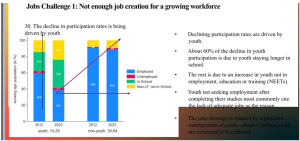
By Joshua Worlasi AMLANU
Ghana’s economy has expanded over the past decade, but job creation has lagged sharply behind the pace of its growing workforce, the World Bank has said in its latest Ghana Economic Update.
Between 2012 and 2023, the working-age population grew by 2.7 million yet net employment rose by only 250,000, according to the report released on Thursday. The Bank warned that this labour market gap threatens the country’s development prospects and its ability to benefit from a demographic dividend.
“Despite GDP growth, job creation in Ghana has not kept pace with the expanding labour force,” said Robert Taliercio, Division Director for Ghana, Sierra Leone and Liberia.
“The challenge is ensuring the growing workforce is absorbed into productive and well-paying employment,” he added.
The report, Addressing Labour Market Challenges and Opportunities in Ghana’s Economic Landscape, found that most jobs created in the past decade were in low-productivity sectors while manufacturing and higher-value services saw limited gains.
This has kept many workers in low-quality roles with few chances for upward mobility, it said.

Better-educated workers are entering the labour market, but the growth of high-quality jobs has not matched the rising supply of skilled labour. Average earnings have declined and underemployment remains high in both rural and urban areas.
“Job creation in Ghana’s most productive sectors has been limited, forcing many workers to remain in low-productivity roles with low-quality pay,” Mr. Taliercio lamented, noting that “weak labour demand in growth-driving industries means workers are often moving between equally low-paying jobs, with few chances to advance”.
The report also highlighted a growing mismatch between education and labour market needs, with women and youth facing persistent barriers to quality jobs. Many young people struggle to transition from school to work, while gender disparities in access to better opportunities remain wide.
The Bank called for an integrated strategy that combines investment in human capital, business-enabling policies and private sector growth. It recommended improving education quality, aligning training with market demands and promoting high-potential sectors such as manufacturing, agro-processing and digital services.
Policymakers, it advocated, should focus on creating conditions for private-led growth: including removing regulatory bottlenecks, expanding infrastructure in energy, transportation and irrigation and mobilising private capital through public-private partnerships.
“Job creation hinges on unlocking private investment in sectors with potential for scale and productivity gains,” said Kwabena Gyan Kwakye, World Bank economist and lead author of the report.
Agriculture remains an important source of employment and could see productivity gains through value chain development and climate-smart practices, the report said.
It also called for stronger social protection systems to shield vulnerable groups during economic transformation.
With the working-age population set to grow further in the coming years, the Bank warned that – without urgent reforms to boost job creation – the country risks rising unemployment, widening inequity and mounting social pressures.
“More and better jobs are essential for achieving inclusive growth and higher living standards. If Ghana can align economic growth with strong labour market outcomes, it will be well-placed to reap the benefits of its demographic transition,” Mr. Kwakye said.
The post Only 250,000 jobs created for 2.7m new workers in 10 yrs – World Bank appeared first on The Business & Financial Times.
Read Full Story
























Facebook
Twitter
Pinterest
Instagram
Google+
YouTube
LinkedIn
RSS